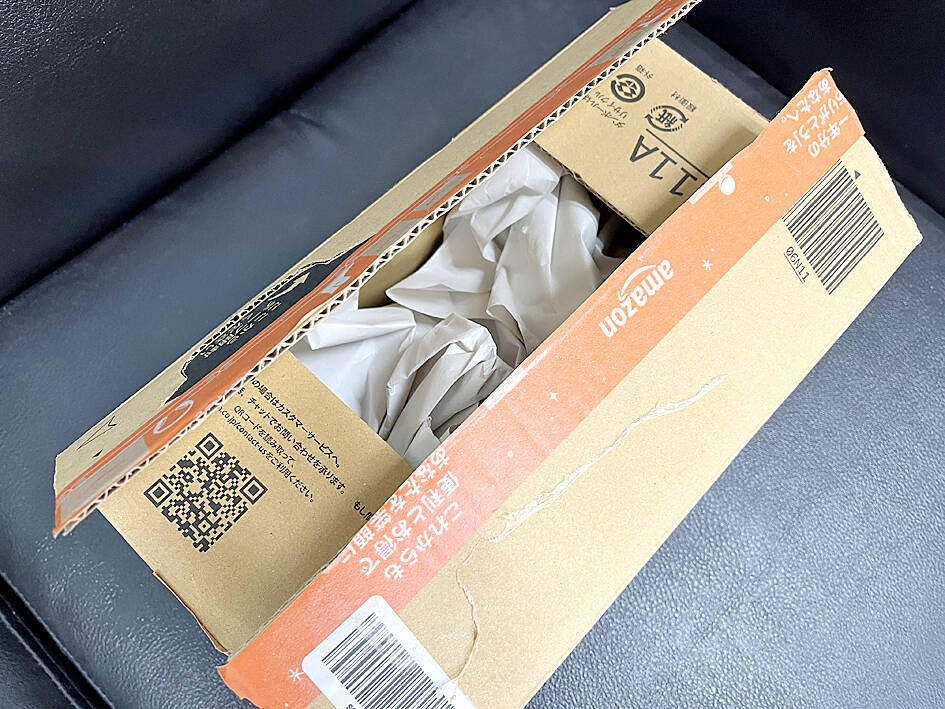Online retailers would be banned from using polyvinyl chloride (PVC) in packaging and must use a certain amount of recycled materials from July, according to new Environmental Protection Administration (EPA) regulations announced on Thursday.
The rise of online shopping has resulted in an increase of packaging waste, with more than 57,000 tonnes of trash produced from 220 million packages sent in 2021, the EPA said.
Many retailers use too much packaging in their shipments, EPA Recycling Fund Management Board executive director Wang Yueh-bin (王嶽斌) said.

Photo: Chen Chia-yi, Taipei Times
Some use large boxes to pack small items, wasting a large amount of paper and plastic, he said.
The new rules that would go into effect on July 1 would only apply to large online retailers such as Momo, PChome, Shopee and vendors that have an official Web site or app for placing orders, the EPA said, adding that they would be applied to personal shipments at a later date.
No PVC plastic would be allowed in packaging, the rules state.
This adds online retail to another ban on PVC in food packaging, which is also to go into effect in July.
Wrappers in natural colors that contain more than 90 percent recycled paper, or plastic packaging made from more than 25 percent reusable plastic, should be prioritized, Wang said
Rules on how much packaging can be used would differ depending on retailer size.
Retailers with more than NT$50 million (US$1.64 million) in capital would be subject to a product-to-packaging weight ratio of less than 40 percent for products weighing between 250g and 1kg, the rules state.
The requirement is less than 30 percent for goods weighing 1kg to less than 3kg, and less than 15 percent for more than 3kg, Wang said.
Retailers with capital of at least NT$150 million would be required to achieve a 25 percent reduction in packaging by next year, followed by 30 percent by 2025 and 35 percent by 2026, Wang said.
They must also use at least 2 percent reusable packaging for products by next year, 8.5 percent by 2025 and 15 percent by 2026, he added.
As fragile items might require more packaging, Wang said that reusable bags or boxes, original product packaging and reused cardboard would not count toward the weight limit.
Retailers that use PVC would be subject to a fine of NT$1,200 to NT$6,000 per package, while those that do not meet weight reduction requirements would be fined NT$30,000 to NT$150,000, Wang said.
Those that do not make corrections in a timely manner could be successively fined, he said.
Reducing packaging waste is not only environmentally friendly, but also saves consumers the trouble of cleaning up, Wang added.

Japanese footwear brand Onitsuka Tiger today issued a public apology and said it has suspended an employee amid allegations that the staff member discriminated against a Vietnamese customer at its Taipei 101 store. Posting on the social media platform Threads yesterday, a user said that an employee at the store said that “those shoes are very expensive” when her friend, who is a migrant worker from Vietnam, asked for assistance. The employee then ignored her until she asked again, to which she replied: "We don't have a size 37." The post had amassed nearly 26,000 likes and 916 comments as of this

US President Donald Trump said "it’s up to" Chinese President Xi Jinping (習近平) what China does on Taiwan, but that he would be "very unhappy" with a change in the "status quo," the New York Times said in an interview published yesterday. Xi "considers it to be a part of China, and that’s up to him what he’s going to be doing," Trump told the newspaper on Wednesday. "But I’ve expressed to him that I would be very unhappy if he did that, and I don’t think he’ll do that," he added. "I hope he doesn’t do that." Trump made the comments in

Tourism in Kenting fell to a historic low for the second consecutive year last year, impacting hotels and other local businesses that rely on a steady stream of domestic tourists, the latest data showed. A total of 2.139 million tourists visited Kenting last year, down slightly from 2.14 million in 2024, the data showed. The number of tourists who visited the national park on the Hengchun Peninsula peaked in 2015 at 8.37 million people. That number has been below 2.2 million for two years, although there was a spike in October last year due to multiple long weekends. The occupancy rate for hotels

A cold surge advisory was today issued for 18 cities and counties across Taiwan, with temperatures of below 10°C forecast during the day and into tonight, the Central Weather Administration (CWA) said. New Taipei City, Taipei, Taoyuan and Hsinchu, Miaoli and Yilan counties are expected to experience sustained temperatures of 10°C or lower, the CWA said. Temperatures are likely to temporarily drop below 10°C in most other areas, except Taitung, Pingtung, Penghu and Lienchiang (Matsu) counties, CWA data showed. The cold weather is being caused by a strong continental cold air mass, combined with radiative cooling, a process in which heat escapes from